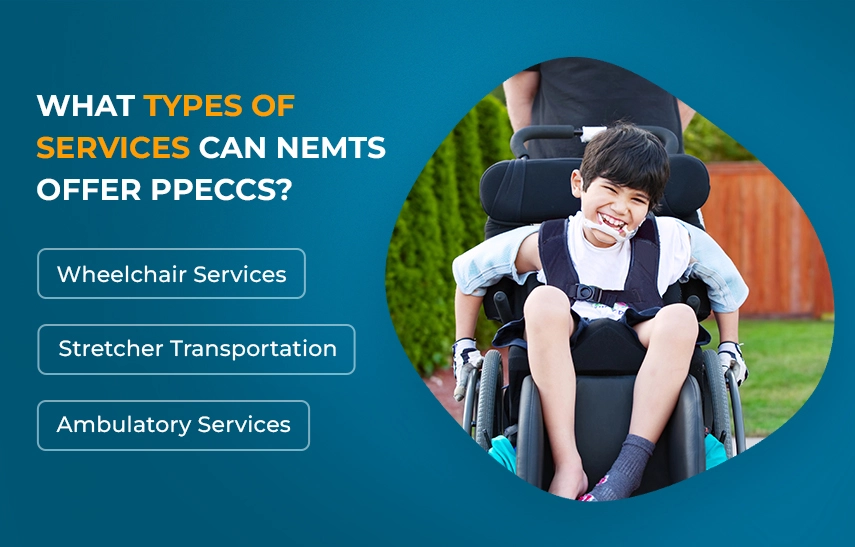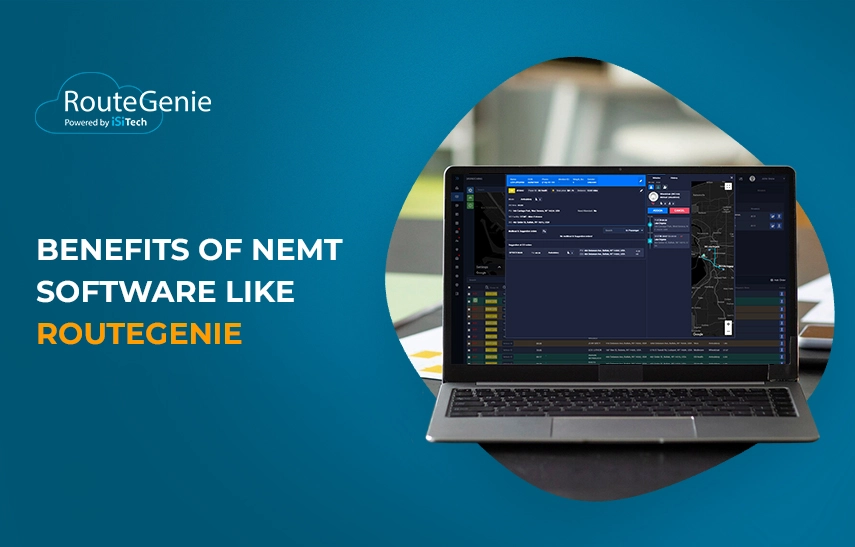Prescribed Pediatric Extended Care Centers (PPECC) and NEMT

Some prescribed pediatric extended care centers (PPECCs) cooperate with NEMT providers to ensure non-emergency medical transportation (NEMT) for children. They take care of picking up the kids from home or school and bringing them home at the end of the day.
NEMTs are specially equipped and wheelchair-accessible to ensure that children are safe and comfortable. NEMT drivers are also First Aid, CPR, and PASS-certified. Children will typically be accompanied by a nurse or CNA (certified nurse’s assistant) with the appropriate caregiver training.
If you operate an NEMT business, it would be beneficial to learn about the PPEC meaning, PPEC services, PPEC requirements, and opportunities associated with them.
Contents:
What is a PPECC?
Prescribed pediatric extended care centers are dedicated facilities for children with complex medical or health problems. They cater to children from 0 to 20 years old, provide medical care and skilled nursing care outside their residences. Typically, a child's doctor must prescribe this service for the child to qualify for extended care.
A PPEC center is a form of daycare that can look after a child's medical needs, provide personal care, and conduct therapy sessions for up to 12 hours per day. This includes any nursing, psychosocial, or developmental care needed. The PPECC requirements, kind, and level of comprehensive care provided will depend on the child's medical problems and developmental stage.
How do NEMTs and PPECCs Work Together?
PPECCs typically provide extended health services and childcare for the medically fragile, those with special medical needs, and children with disabilities. Because of the special transportation and mobility requirements, PPECCs are typically partnered with NEMT providers for quick, safe, and comfortable transportation for young passengers.
Non-emergency medical transportation is designed to alleviate parents' difficulties in arranging transportation for their special needs children. In some cases, both parents work full-time or might not have access to a suitable vehicle to accommodate a wheelchair and other equipment. NEMTs solve this problem by securely carrying passengers to and from home, school, check-ups, and PPECCs.
What Types of Services Can NEMTs Offer PPECCs?
 NEMT companies provide the following transportation services:
NEMT companies provide the following transportation services:
- Wheelchair Services: Non-emergency wheelchair services include lift vehicles, wheelchair ramps, and wheelchairs.
- Stretcher Transportation: This is for passengers who are unable to sit upright due to comfort issues or medical reasons.
- Ambulatory Services: Vans and passenger vehicles that can comfortably transport people to and from medical appointments. They serve as efficient non-emergency transportation for passengers who can walk on their own.
To learn more about types of NEMT services you can read our blog “Types of Non-Emergency Medical Transportation Services”.
Medicaid and NEMT Benefits
Non-emergency medical transportation is a requisite Medicaid benefit. The scope of NEMT benefits is determined per state, but a wide range of services are typically covered. This includes trips in vans, cars, and buses deemed fit for NEMT.
NEMT benefits are crucial for children and youth with special healthcare needs. This is because they need regular and prompt access to medical appointments, checkups, and treatments.
However, transportation barriers may cause delays in care. This highlights the importance of knowing about the scope of NEMT benefits in one's state.
According to federal law, states must have specific plans for the transportation methods they will provide for Medicaid beneficiaries. States are also mandated to indicate coverage for travel expenses in order to secure medical treatment or undergo medical examinations.
Per the Consolidated Appropriations Act of 2021, every state’s Medicaid program should ensure that all transportation providers meet specific requirements. This includes valid driver’s licenses and reporting traffic violations a driver may have incurred. Providers include transportation network companies, drivers, and ridesharing companies.
RouteGenie: All-in-one NEMT Software
RouteGenie is a modern software solution for NEMT providers. It automates all NEMT processes and is built to improve scheduling, billing, routing, and dispatching. All of these software features will be useful for NEMT carriers who intend to cooperate with the PPECCs.
The software helps manage issues like:
- Vehicle breakdowns
- Traffic problems
- Driver call-offs
- Cancellations
- No shows
- Add-on trips
- On-demand trips
RouteGenie NEMT software is comprehensive and customizable. It aims to provide whatever your company needs. It is ideal for both growing startups and large fleets, as it focuses on automating scheduling, routing, dispatching, and billing.
In addition to helping businesses save time and money, the NEMT software also aims to boost efficiency and increase revenue.
Benefits of NEMT Software Like RouteGenie
 Here are some of the benefits of leveraging NEMT software for your business:
Here are some of the benefits of leveraging NEMT software for your business:
Optimize scheduling
Say goodbye to human error and inefficient scheduling processes. With RouteGenie, you’ll have a fully automated scheduling process that optimizes the use of your fleet and drivers. The software assesses the most appropriate type of vehicle per passenger, ensuring safety and satisfaction every time.
Reduce driver load
RouteGenie automatically computes the capacity each vehicle can handle and searches for multi-load opportunities to optimize the space available. According to RouteGenie users, the software results in 25% more trips completed.
Streamline billing
RouteGenie facilitates electronic billing to minimize errors and save time. The platform’s HIPAA-compliant billing system generates digital invoices and shares them with clients in minutes.
Optimize routes for drivers
The system does all the work when it comes to routing, as it can determine the most efficient paths for each trip. This saves time and gas expenses and ensures passengers get to their appointments on time. Just log in and view the best routes available.
Track maintenance needs
Drivers are required to complete pre- and post-trip checklists on the platform, so if there are issues with a vehicle, you can work on it right away.
Improve on-time performance
The software also automatically determines the best pick-up and drop-off windows for every trip, enhancing overall performance and efficiency.
Reduce fuel use
With more efficient routing and scheduling, fleets benefit from lower fuel consumption while increasing the number of trips made and passengers serviced.
Frequently Asked Questions
What does PPEC mean?
PPEC stands for prescribed pediatric extended care. Facilities dedicated to PPEC provide youth and children assistance with medically complex health needs outside their residences. They can stay in these facilities for up to 12 hours.
How many states have PPEC?
As of September 2024, these 15 states offer PPEC: Delaware, Florida, Georgia, Iowa, Louisiana, Kentucky, Maryland, Mississippi, Nebraska, North Carolina, Ohio, Pennsylvania, Texas, Vermont, Wisconsin.
